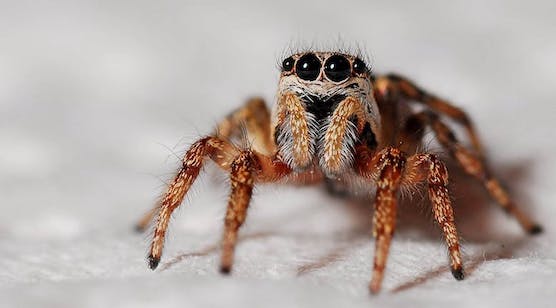Join us tomorrow afternoon at 4:30 in the Strange Lounge of Main Hall for the Strange Philosophy Thing. All are welcome to this informal conversation, and to our refreshments!

According to the extended mind hypothesis, sometimes objects outside of an individual’s body can come to constitute part of that individual’s mind. This view, originally articulated in a 1998 paper by philosophers Andy Clark and David Chalmers, has primarily been considered as a hypothesis about human thought. However, some exciting recent research within evolutionary biology suggests that it might be even more applicable to invertebrate minds.
As discussed in this fascinating article, evolutionary biologists Hilton Japyassú (Federal University of Bahia) and Kevin Laland (University of Saint Andrews) have, “argued in a review paper, published in the journal Animal Cognition, that a spider’s web is at least an adjustable part of its sensory apparatus, and at most an extension of the spider’s cognitive system.” Through a series of experiments, Japyassú has demonstrated that “changes in the spider’s cognitive state will alter the web, and changes in the web will likewise ripple into the spider’s cognitive state,” suggesting that the two are working together as a larger cognitive system. In a series of studies, for example, Japyassú showed that web-building spiders, which “are near blind, and…interact with the world almost solely through vibrations” are “put on high alert” and “rushed toward prey more quickly” when strands of their web were artificially tightened by experimenters, leading these strands to transmit vibrations more forcefully. And, as the article notes, “the same sort of effect works in the opposite direction, too. Let the orb spider Octonoba sybotides go hungry, changing its internal state, and it will tighten its radial threads so it can tune in to even small prey hitting the web. ‘She tenses the threads of the web so that she can filter information that is coming to her brain,’ Japyassú said. ‘This is almost the same thing as if she was filtering things in her own brain.’”
The fascinating article includes a number of other neat examples, involving spiders, octopuses, and grasshoppers. In fact, as the article discusses, it may turn out that extended cognition strategies are favored by natural selection for small organisms, and therefore that the extended mind hypothesis more accurately describes invertebrates than any other group of animals. Haller’s Rule, first proposed by the Swiss naturalist after which it is names in 1762, is a general rule of biology, which holds across the animal kingdom: “smaller creatures almost always devote a larger portion of their body weight to their brains, which require more calories to fuel than other types of tissue.” Work by Japyassú and others, though, is beginning to suggest “that spiders outsource problem solving to their webs as an end run around Haller’s rule”. If this is explained by evolutionary considerations related to Haller’s Rule, then we would expect to see responsive relationships between other small animals and components of their environments as well.
Opponents of Japyassú object to his definition of cognition in terms of acquiring, manipulating and storing information, suggesting that this misses an important distinction between information and knowledge. Cognition, they contend, involves interpreting information “into some sort of abstract, meaningful representation of the world, which the web — or a tray of Scrabble tiles — can’t quite manage by itself”. Others contend that Japyassú’s research misrepresents the amount of embodied, non-extended cognition that spiders are capable of. For example, “Fiona Cross and Robert Jackson, both of the University of Canterbury in New Zealand…study jumping spiders, which don’t have their own webs but will sometimes vibrate an existing web, luring another spider out to attack. Their work suggests that jumping spiders do appear to hold on to mental representations when it comes to planning routes and hunting specific prey. The spiders even seem to differentiate among ‘one,’ ‘two’ and ’many’ when confronted with a quantity of prey items that conflicts with the number they initially saw.”
I look forward to talking with you about all this—about animal minds, extended minds, and the way our environments might enter into thought—tomorrow at the Strange Thing!
